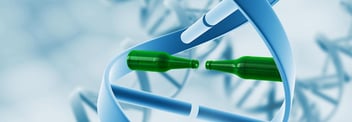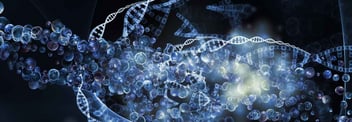DNA: I Am Who I Am… or Am I? – Session One
- Home
- Blog

Does DNA Determine My Destiny?
“No sane biologist believes that we are entirely the product of their genes, but once you bring genes into the picture, then our perception of ourselves can no longer be the same.”
– Paul Berg, Nobel Laureate in Chemistry
“DNA + Environment + Triggers + Chance = the Structure and Function of All of the Cells in Your Body. They determine ‘Biological You’ throughout your lifespan.”
– Bruce Alan Kehr, M.D.
I have some straightforward yet profound questions for you this week: Do you believe you can change who you are? Can you change your fundamental nature? Do you believe in free will, or that your future is already determined? Your answers to these simple questions signify an entire worldview—an internal belief system that unconsciously determines much of your behavior, including the future you allow yourself to dream about, to aspire to, and perhaps hold yourself back from. From careers to romance to dreams and fantasies, our belief—or lack thereof—in our ability to change affects everything. But, contrary to popular belief, the questions I laid out for you at the beginning of this paragraph are hardly subjective. After decades of research into the mind and body, the scientific experts have come to a unanimous answer: Yes. You can change who you are—and not just on a superficial level, but in the deepest way possible for a human being to evolve and adapt: Reader, you have the power to change how your very DNA expresses itself and determines the structure and function of Biological You. And in this new blog series, I’m going to show you how—and why—you should take advantage of the most powerful tools we have available to us to make your mental and physical health better than they’ve ever been before. In this series, we’re going to unmask many of the complexities and surprising answers to another seemingly straightforward question: DNA: I am who I am… or am I? ™
Many people believe that psychotherapy and psychiatry are imprecise fields. Au contraire. In fact, our thoughts, feelings, behaviors, and cognition are intimately linked to biological processes. To put it another way, “depression”, “happiness”, and “stress” are not just descriptions of our mental selves… they are indicators of very real—and very adaptable—biological processes defined by the intricate makeup of genes in our physical selves. I believe that this relationship must be made more explicit. And my goal this series is to break down some of the most innovative, fascinating, and cutting-edge research into our minds and bodies—research that proves once and for all that you can change your being on many levels, from the molecular all the way up. I’m going to give you the tools and the insights you need to make small lifestyle changes that can bring about a substantial impact. But first and foremost, we need to take a closer look into why some people don’t think they have the power to change, and why the first thing I want them to reconsider is their attitude—to bring hope to this malignant form of hopelessness.
“I am who I am, Doc”. I hear it all the time from some of my most stubborn patients. Whether they’re suffering from addiction or trauma, so many of the people I meet with weekly are burdened by feelings of helplessness when it comes to the notion of changing themselves. They say it casually enough, but the sad significance of those words tells me something is going on much deeper than they may realize: they’re suffering from social defeat stress and learned helplessness. Learned helplessness results when we are repeatedly subjected to environmental stress where we feel powerless and trapped. Defeat stress develops when we feel repeatedly defeated or “beaten down.” But these are not just psychological vocabulary words: They are indicators of something that happens to affect the very DNA found in our brain cells. When we feel powerless, our brain literally stops producing as many “neuroprotective proteins,” molecules that protect, nurture, and grow the brain cells and their connections to one another, that allow our brain circuits to function normally. And so I help them achieve more power and control over themselves and their lives, which in turn increases their DNA’s production of these neuroprotective proteins. And dear reader: If this fact doesn’t instill in you a sense of power about the role you can play with your own genetic makeup, feel free to remain cynical. But please keep an open mind and read this weekly series on “Actionable DNA” ™ in the weeks and months ahead. I promise that I will share with you some profoundly inspiring DNA-based interventions that will enable you to live a happier, healthier, longer life.
There is an intricate connection between mind and body, DNA and lifestyle choices, that scientists are beginning to link together. This emerging field is called Epigenetics. Our brains are far more adaptable than many of you may realize—the term that captures it best is neuroplasticity. Our brains are also uniquely ours, and that means the more we know about how they work, the better and more precise the treatments can be when and if we need them. I am proud that Potomac Psychiatry has been on the forefront of Precision Medicine for years, as five years ago we started to administer genetic tests that begin to outline each of our patients’ unique neurochemical makeups. From there, we can adapt our medication and supplement regimen and work to change patient makeups through talk therapy as well. We call this practice the Biopsychosocial Model, and believe it is the future of mental health care.
Reader, you can change who you become. You can change the expression of many of your genes, you can change many aspects of your brain, your body, and your mind. We’re just at the starting line of this series—but just wait! See what you can learn to become by the time we’re finished!
DNA: I Am Who I Am… or Am I? Blog Series
- Does DNA Determine My Destiny?
- Tinker with Your Genes to Determine Your Destiny
- A Simple Cheek Swab Brings Good Karma
- Test Your DNA to Determine Your Reality
- The BDNF Gene: Use “Fertilizer” to Grow a Majestic ”Rainforest Brain”… and Introducing “GENiE” and “DNA 4 KIDS”
- The MTHFR Gene: “Manufacture” Your Way to Health and Happiness Featuring “DNA 4 KIDS” with “GENiE”
- The SLC6A4 Gene (Serotonin Reuptake Gene): Improve Your Mood and Anxiety through a Simple Cheek Swab Featuring “DNA 4 KIDS” with “GENiE”
- Tame that Emotional Roller Coaster Ride Genetic Testing for the ANK3 Gene and CACNA1C Gene Featuring “DNA 4 KIDS” with “GENiE”
- Is Addiction Inherited? Genetic Testing for the OPRM1 Gene, Opioid Abuse, and Alcoholism Featuring “DNA 4 TEENS” With “GENiE”
- Surf’s Up: Use Your Genetic Code to Ride the Stress Wave with Ease The COMT Gene Featuring “DNA 4 KIDS” With “GENiE”
- Mental Illness is not a Myth—and Human Genomics Proves It The DRD2 Gene and Dopamine Featuring “DNA 4 KIDS” With “GENiE”
- ADHD in the Age of Distraction The Tricky Genetics behind ADHD and ADRA2A Featuring “DNA 4 KIDS” With “GENiE”
- Overweight and Obesity – Is it Me, or My DNA? 5HT2C and MC4R: Can Your Genes Make You Fat?
- Is Alcoholism Inherited? Can a Tiny Gene Help Treat It? The GRIK1 Gene
- 2018 Women’s Health and Wellness Summit DNA Keynote Address
Related Information
- Learn about Genetic Testing
- Learn about Potomac Psychiatry
- Meet Our Doctors
- Contact Potomac Psychiatry
.png?width=144&height=144&name=Untitled%20design%20(34).png)



